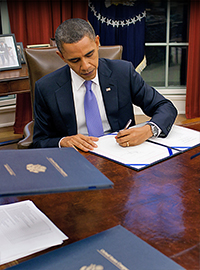| White House: Obama “Very Interested” in Unilaterally Raising Taxes |
 |
|
By Ashton Ellis
Wednesday, March 04 2015 |
If his press secretary is to be believed, President Barack Obama is considering whether to use executive actions to unilaterally raise taxes. “The president certainly has not indicated any reticence in using his executive authority to try and advance an agenda that benefits middle class Americans,” White House Press Secretary Josh Earnest said on Monday. “Now, I don’t want to leave you with the impression that there is some imminent announcement, there is not, at least that I know of,” Earnest told reporters at a daily press briefing. “But the president has asked his team to examine the array of executive authorities that are available to him to try to make progress on his goals. So I am not in a position to talk in any detail at this point, but the president is very interested in this avenue generally.” Earnest’s admission was in response to a question for comments about a letter sent by Senator Bernie Sanders (I-VT) last Friday. In the letter, Sanders called on President Obama and Treasury Secretary Jack Lew to eliminate six corporate tax breaks that, combined, could generate $100 billion in additional tax revenue for the federal government over the next decade. Sanders, the ranking minority member on the Senate Budget Committee, is explicitly calling for executive action if Congress refuses to pass his version of tax reform. Three of the tax breaks to be eliminated were previously created via Treasury regulations. In Sanders’ view, all it takes to enact massive changes in the federal tax code is presidential whim. The other three provisions on the chopping block owe their existence to a broad delegation of power to Treasury from Congress to implement U.S. tax laws. On the surface, Sanders’ argument sounds plausible. If Congress gave the Treasury Department leeway to write the tax rules, then it’s up to Treasury to decide what America’s tax laws should be. The problem with this analysis is that it fundamentally misunderstands the relationship between Congress and the bureaucracy. Treasury has no more power than Congress delegates to it, and it seems obvious that the reason these tax breaks exist is because they best approximate the tax policy intended by Congress. As the Wall Street Journal explains, “Tax laws tend to give more flexibility to the Treasury Department to implement changes because it can be tricky to get the language right in the statute.” Getting the language right is not the same thing as getting a blank slate. One of the major justifications for the existence of expert-heavy bureaucracies is that they are better equipped to implement the policy goals that Congress lays down. These goals are codified in federal statutes. If the bureaucracy – or the president that directs it – prefers a policy that opposes congressional intent – here, raising taxes on corporations – a change in policy would be void because it lacks authority. This kind of legal reasoning used to be standard fare. But President Obama’s unilateral executive actions granting effective amnesty to millions of illegal immigrants is rapidly altering what’s considered possible. If the Department of Homeland Security can be directed to give work permits, Social Security Numbers and drivers licenses to people who would otherwise be deported, erasing a few tax breaks that irritate the liberal intelligentsia is tame by comparison. The timing of Sanders’ letter and Earnest’s response should be a wake-up call to Republican leaders in Congress. Sanders sent his letter on the day the GOP agreed to extend for a week Homeland Security’s expiring budget. Earnest was only too eager to admit that Obama’s penchant for executive overreach is a key element in accomplishing his policy goals. If this latest development confirms anything it is that President Obama will not stop usurping Congress’ role as lawmaker until the legislative branch gives him a reason to. If Republican leadership continues to capitulate they might as well save taxpayers money and shut down Capitol Hill. The Obama administration is happy to do the job instead. |
Related Articles : |
























